
Testimony Before the City Planning Commission Regarding the Ladies’ Mile Rezoning on May 25, 2004
Liz Krueger
July 12, 2010
Good morning, I am State Senator Liz Krueger and I represent the 26thSenatorial District, which includes the northern portion of the Ladies Mile Historic District. I would like to thank the City Planning Commission for the opportunity to testify at today’s hearing.
While I appreciate the Department of City Planning’s stated intentions to encourage the development of housing while solidifying the built character of the Ladies Mile Historic District, I do not feel that this particular action is appropriate for this neighborhood. Considering that this action could exacerbate some of the most significant quality-of-life problems faced by local residents, I join the Borough President and other elected officials in recommending that the rezoning be reconsidered until certain conditions are addressed.
Firstly, a rezoning to C6-4A would allow bars and large nightclubs that accommodate over 200 patrons to be built as-of-right. This is a potentially devastating component of the action that must be addressed if the City Planning Commission is serious about fostering a mixed-use neighborhood that is a viable place to live. The alarming proliferation of bars and nightclubs in this direct area has resulted in legitimate quality-of-life problems for its residents, to the point where Community Board Five issued a moratorium on new liquor licenses. The current special permit requirement that is associated with the area’s status as a manufacturing district has functioned as a safeguard against the further spread of large clubs, and it is essential for any rezoning action to provide comparable, if not more stringent regulation of nightlife activity. Perhaps an appropriate solution would be to prohibit ground-floor bars and clubs in any new buildings constructed on the affected lots, much like Zoning Resolution 74-712 accomplished for a Soho neighborhood facing similar challenges last year. Since the subject of today’s hearing is a rezoning within a Historic District, it can contain provisions that limit these types of uses without applying the change to every C6-4A district in the City.
The related issues of traffic and parking must also be addressed. The zoning application calls for the construction of public parking garages that will not replace the parking spaces lost when the current lots are developed, despite the fact that nearly 1,000 new residential units are expected and the neighborhood already suffers from traffic congestion and a scarcity of parking. This is not acceptable, as every effort must be made to address the additional strain on the area’s parking supply and to mitigate the impact of additional traffic, which could have adverse impacts on the neighborhood’s noise levels and air quality.
I was also disappointed that the rezoning action does not do more to promote affordable housing. As you know, New York City is in the midst of an affordable housing crisis. As this administration is proposing an unprecedented set of rezoning and redevelopment plans in all five boroughs, it is essential that zoning be ambitiously used as a mechanism for creating housing units that are permanently affordable for low to moderate-income New Yorkers. Because it is a voluntary program that is relatively limited in its potential, the inclusionary zoning proposed in this action is simply not enough.
Finally, I am concerned about the future of the manufacturing businesses that will be inevitably displaced if the area is rezoned. According to a New York Industrial Retention Network survey, the area contains about 40 manufacturing companies that provide over 1,000 jobs. While I agree with DCP’s determination that the M1-6 designation is obsolete, it is important to provide relocation assistance to the firms that will struggle to survive once the area is rezoned. In the context of several initiatives to rezone manufacturing land in Manhattan, this type of assistance is more critical than ever.
Once again, thank you for the opportunity to testify today. I look forward to working with the City Planning Commission, local elected officials, and community members to ensure that Ladies Mile thrives as a mixed-use neighborhood that is sensitive to the needs of its residents.

